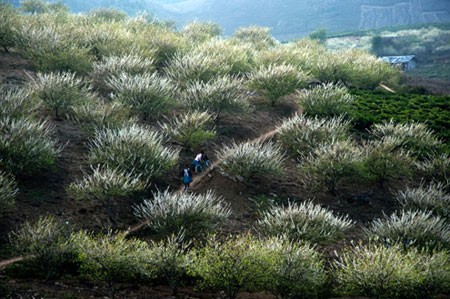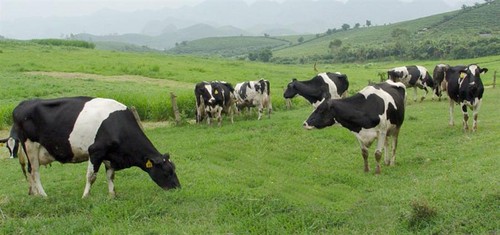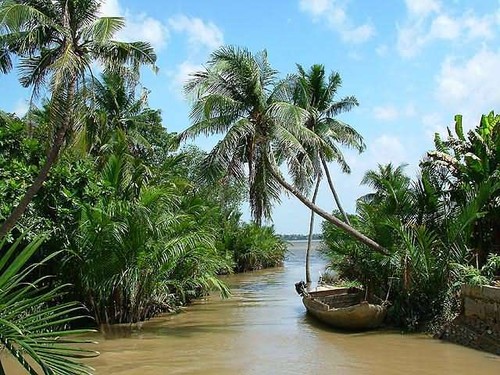A: On October 27, we adjusted the frequencies of our winter broadcasts. We made some minor changes and have sent the latest frequency list to listeners by mail. For now, listeners in Europe, Central Asia, and Eastern America please take note of the following adjustments.
B: Pen and paper ready? VOV’s relayed broadcast from Moosbrunn, Woofferton, and Dhabayya to Europe at 18:00 and 18:30 UTC is on 5955 kHz. Our broadcast from Woofferton, and Cypress Creek to Eastern America at 01:00 UTC and 02:30 UTC, and to Central America and the Caribbean at 03:00 UTC is also on 6175 kHz.
A: We’ll announce the changes again in our next Letter Box and you can also find it on our website at www.vovworld.vn. We hope to receive your feedback on the quality of the signal soon.
B: We had an interesting email exchange with one of our regular listeners in Bangladesh, Ashik Eqbal Tokon, about names and what we call each other in Bangladesh and Vietnam. Ashik wrote: “A great big thanks for briefing me on how to address a Vietnamese. It’s really difficult to imitate the pronunciation of your names in the program, but as I tune you in a little bit longer, I think I’m able to do it a little. But I really know nothing about Vietnamese names. Here in Bangladesh, the first name is our given name and the last name is our family or religious name. It’s the same in India. For example, Mr. Jayanto Chakroborty’s given name is Jayanto and Chakroborty is his family name.”
A: In Vietnam, a full name consists of three parts. The family name stands first, then comes the middle name. The last name is the given name. For example, my name is TRINH NGOC HUYEN. Trinh is my family name, Ngoc is my middle name, and Huyen is my given name. People address each other using their givern name.
B: In specific cases, we respectfully refer to someone by his/her full name. We often add a prefix - Mr, Mrs, and Ms, or a family relationship such as grandmother, grandfather, uncle, aunt, or a professional or job title such as teacher, professor, Director, Prime Minister, President etc, before a full name or a given name. On the Letter Box, we prefer to call our listeners by their given names, in the Vietnamese style.
A: Ashik, we really appreciate your dedication to our program, demonstrated by your regular feedback after listening to our program and reception reports sent by post mail. We’re very glad to have your long-term support.
B: In India, Muhammad Shamim wants to know about eco-tourism projects in Vietnam. There are hundreds of small and big eco-tourist sites across Vietnam, from the northern mountains to the central coast and the southern Mekong River delta. They exploit natural advantages such as a cool climate, mountains, and forests in the north, year-round sunshine and long, beautiful beaches on the central coast, and mangrove forests and inter-lacing rivers in the south. On today’s Letter Box, we want to talk briefly about Moc Chau Plateau in the northern province of Son La, about 200 km northwest of Hanoi. This introduction is for Mr. Herve Vincent of France, who said he wanted to visit Moc Chau in December and asked can he visit a milk farm there?

White plum blossoms cover Moc Chau’s mountain and forests in spring (photo: vnexpress.net)
|
A: Son La province has eco-tours of many places in the province including Moc Chau plateau, which is one of VN’s major dairy and tea centers. Located at a height of more than 1,000m above sea level, Moc Chau is a steppe with green tea-covered hills, and the widest and the most beautiful fields of grass in the northern mountains.
B: The average temperature of Moc Chau is 18.5 DC which is lower than neighboring areas such as Son La City (21 DC), Dien Bien (23 DC). Moc Chau has a special beauty in each season. From January to March, white peach and plum blossoms cover Moc Chau’s mountain and forests. From April to August, the temperate climate attracts a large number of tourists escaping the hot summer in Hanoi and the northern delta provinces. Peach and plum trees have fruits at this time and tourists can pick and enjoy fresh fruit right from the orchard.
A: From October to January, white blumea flowers and wild sunflowers are in full bloom. Moc Chau makes a colorful picture with white blumea, sunflowers, and red poinsettia. On Moc Chau dairy farms, dairy cows graze leisurely in immense green pastures. Here tourists can enjoy delicious products prepared from cow milk - fresh milk, yoghurt, milk cakes... and also experience a typical working day on dairy farm.

Dairy cows graze leisurely in immense green pastures
|
B: There are currently 500 households in the district engaged in raising dairy cows to provide milk to the Moc Chau Milk Company. Every household raises at least 10 dairy cows and some families raise as much as one hundred cows. The farmers received support from dairy companies in buying breeding cows, the techniques of raising dairy cows, artificial insemination, and cattle feed resources. According to the development plan of the Ministry of Agriculture and Rural Development, Moc Chau District is one of five major areas for developing dairy cows in Vietnam and Moc Chau Milk is the national centre for breeding dairy cows.
A: From Sweden, Christer Brunstrom wrote: “I certainly enjoyed your nice songs about rivers. Not that long ago, I heard a feature on Bangladesh Betar talking about that nation’s most important rivers. In many countries, the rivers are of paramount importance and certainly deserve musical recognition.”
B: Rivers surely have an important position in human life. In Vietnam in the past, people said the best place to live is near a market, and the second best is near a river. That view still persists to a certain extent.

Rivers are roads in the Mekong Delta |
A: Time is up on VOV. Before we go, we’d like to acknowledge letters from Pak Ning Tjang and Fachri of Indonesia, Kaj Bredahl of Denmark, Abid Hussain Sajid and Zahid Abbas, President of the Glaxy Listeners Club in Pakistan, and Vikram Keshvala of the UK. We’ll verify your reception reports and send you our QSL cards soon. That’s it for today’s Letter Box. We welcome your feedback at: English section, Overseas Service, Radio Voice of Vietnam, 45 Ba Trieu Street, Hanoi, Vietnam. Or you can email us at: englishsection@vov.org.vn. You’re invited to visit us online at www.vovworld.vn, where you can hear both live and recorded programs. Good bye from Hanoi.